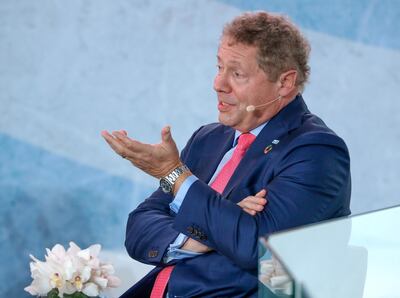An emminent epidemiologist has called for global leaders to invest now in vaccine development to prevent another coronavirus from causing a pandemic as severe as Covid-19.
Scientists have identified 30,000 coronaviruses with the potential to transmit from animals to humans, and another outbreak is an “evolutionary certainty”, according to Dr Seth Berkley, CEO of Gavi, the Vaccine Alliance.
In an interview with The National, Dr Berkley urged global leaders to back organisations like Gavi and the Coalition for Epidemic Preparedness Innovations, which funds a system to radically accelerate the development and manufacture of vaccines.
Known as “platform technologies”, they use the same basic components as their starting point to create a sort of generic vaccine. This can be adapted for use against different pathogens by the insertion of new genetic or protein sequences. Having such a system in place has the potential to dramatically speed up the search for a new vaccine when an outbreak occurs.
The World Health Organisation said it is working with major partners, including Cepi, to invest in vaccine development, while G20 leaders have pledged to do “whatever it takes” to minimise the damage of Covid-19 across the globe.
But there are fears that once this pandemic is over, countries will fail to invest in preventative measures for future outbreaks.
“It is evolutionarily certain we will have more outbreaks,” Dr Berkley said.
“Every country pays for a military in peacetime and the purpose of that is to have it prepared. We need to think the same way with these diseases. What we should be doing is having tools that are ready to go.
“We also should be doing research on which particular organisms are a risk, and trying to figure out what we can do about them. In doing that, we make the world a safer place.”
The UAE, alongside South Korea, has been a firm backer of organisations working to prevent disease outbreaks, such as Gavi. Sheikh Mohamed bin Zayed, Crown Prince of Abu Dhabi and Deputy Supreme Commander of the Armed Forces, gave Gavi a private donation of $33 million (Dh121.2m) in 2011. The UAE gave another $5m for campaigns in Afghanistan. It has also invested heavily in efforts to wipe out polio, pledging $120m in 2013.
“As the leader in the region, the UAE had the vision to understand why it was important nine years ago to provide this type of support,” Dr Berkley said.
The UAE hosted Gavi’s mid-term review in Abu Dhabi in 2018, which brought together leaders and the global health community to find ways to increase access to immunisation in the world’s poorest countries.
The Geneva-based organisation has immunised more than 760 million children, including at least 288 million in Organisation of Islamic Cooperation states, and is estimated to have prevented 13 million early deaths.
Preparing for an outbreak is particularly important in the Middle East, which is a major hub for movement of people. One of the worst-affected countries in the current coronavirus outbreak is Iran, which has an official death toll of more than 3,000. However, there are concerns the actual figures are much higher.
“People tend to think this is all about humanitarianism or charity,” Dr Berkley said. “It is also about self-protection.
“The Middle East has a huge number of people coming back and forth. It has not only big airport terminals but it also has a lot of migrant workers. It has the Hajj and you have the other religious pilgrimages.”
Population growth in the developing world, which has a significant impact on the environment, could lead to more of the viruses being transmitted and spreading into other regions, such as the Middle East.
“The population of the world is growing, and particularly in poor countries," Dr Berkley said. "When it’s growing, you need to expand land for agricultural use. You’re going to have desertification that will require movement [of people].”
Dr Berkley warned that a future outbreak could be even worse than Covid-19, which has a lower death rate than other coronaviruses. “In this case [Covid-19], you have a mortality rate of 1 per cent, which is overwhelming health systems around the world,” he said.
“Sars and Mers had much higher mortality rates, but they’re much harder to transmit. Imagine if you had the mortality rate of Sars and the transmissibility rate of Covid-19. That’s a scary thought.”



